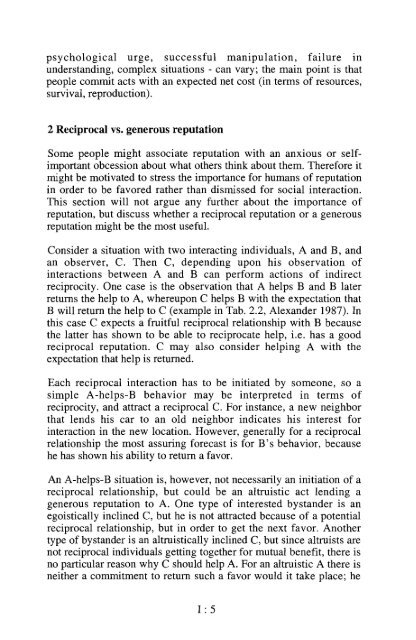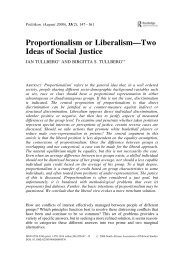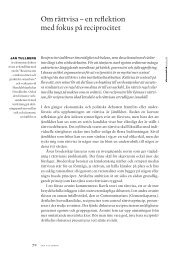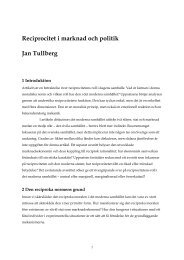- Page 1:
Reciprocitet- etiska normer och pra
- Page 5 and 6:
Reciprocitet- etiska normer och pra
- Page 7:
FöretalFöreliggande arbete utgör
- Page 10 and 11:
kopieringsapparater. För bistånd
- Page 13:
Reciprocitet- etiska normer och pra
- Page 17 and 18:
Reciprocity - Bthical norms and pra
- Page 19 and 20:
One idea would be to view the three
- Page 21 and 22:
Since ethics has not yet developed
- Page 23 and 24:
individer eller främjar ett högre
- Page 25 and 26:
så allt som uppnås är en viss in
- Page 27 and 28:
eskrivande och en mer värderande b
- Page 29 and 30:
övergripande syn som skall balanse
- Page 31 and 32:
Många religiösa ser egoistiska in
- Page 33 and 34:
Också i den moderna sociobiologisk
- Page 35 and 36:
antaganden: Spelarna är maximerare
- Page 37 and 38:
lir resultatet enligt spelteorin Ic
- Page 39 and 40:
Strategisk analys.Det tredje konstr
- Page 41 and 42:
världsbild som ersättning för de
- Page 43 and 44:
2.1 Olika handlingskategorierNågot
- Page 45 and 46:
omgivningen; en källa till en stö
- Page 47 and 48:
2.2 De tre sfärernaDe tre huvudalt
- Page 49 and 50:
eciproke är mindre optimeringsinri
- Page 51 and 52:
värderingar ger altruistiska handl
- Page 53 and 54:
det samhällsvetenskapliga perspekt
- Page 55 and 56:
socialdemokrati ha bytt ut ordet j
- Page 57 and 58:
få därför. Också syndare göra
- Page 59 and 60:
vara värdig, inte så mycket för
- Page 61 and 62:
långa släp för att dölja högkl
- Page 63 and 64:
härskarens rätt att förpassa soc
- Page 65 and 66:
ytas av den som senare visar sig bl
- Page 67 and 68:
en stammedlem i en primitiv kultur,
- Page 69 and 70:
Ett primärt behov är att mobilise
- Page 71 and 72:
omfördelning som bedrivs i de mode
- Page 73 and 74:
Trots en central historisk roll har
- Page 75 and 76:
preferens. Den historiska utvecklin
- Page 77 and 78:
Figur 4 Etikens influensFokuserar m
- Page 79 and 80:
ehandlas separat och enligt gängse
- Page 81 and 82: med en evolutionär värld kommer a
- Page 83 and 84: Men det är på intet sätt säkert
- Page 85 and 86: ett sätt att särskilja goda regle
- Page 87 and 88: klassas FP i någon av de tre grupp
- Page 89 and 90: Alltsedan Mandeville har liberaler
- Page 91 and 92: som "det egocentriska predikamentet
- Page 93 and 94: kreativ, utan som ett tecken på at
- Page 95 and 96: Problem med typologier penetrerades
- Page 97 and 98: 4.1 'On Indirect Reciprocity • be
- Page 99 and 100: analys visar dock att kritiken mot
- Page 101 and 102: egränsas av instrumentella möjlig
- Page 103 and 104: ekonomiskt experiment så ger det e
- Page 105 and 106: Förväntningen var att altruister
- Page 107 and 108: 5 SlutordI ett första avsnitt 5.1
- Page 109 and 110: evolutionsteorin.Filosofer som Mich
- Page 111 and 112: ÄrlighetskravetTalleyrand skrev at
- Page 113 and 114: Ett centralt resultat för ärlighe
- Page 115 and 116: altrllism kvarstår som moralens es
- Page 117 and 118: mellan altruism och reciprocitet ty
- Page 119 and 120: uppenbarligen manifesterar sig i v
- Page 121 and 122: Min utvärderingsmodell är inte Ul
- Page 123 and 124: Campbell, Richard 1979. Self Love a
- Page 125 and 126: Milgram, Stanley. 1974. Obedience t
- Page 127 and 128: Trivers, Robert L. 1971. 'The evolu
- Page 129 and 130: On Indirect Reciprocity- Between Re
- Page 131: In Alexander's 21 categories of hum
- Page 135 and 136: in labeling everything reciprocity
- Page 137 and 138: paper.Altruistic messages are indee
- Page 139 and 140: Figure 1.Categories of indirect rec
- Page 141 and 142: held in the field of ethics. The ma
- Page 143: Lopreato, J. 1981. Toward a Theory
- Page 146 and 147: IntroduktionEtisk Egoism är en nor
- Page 148 and 149: I etisk egoism lägger jag en norma
- Page 150 and 151: ligger i hans eget intresse att skj
- Page 152 and 153: men enligt teorin finns en benägen
- Page 154 and 155: hopp om den hjälp som han önskar.
- Page 156 and 157: Figur 1Handling 1Person BHandling 2
- Page 158 and 159: Det är bäst att välja Handling 2
- Page 160 and 161: kreativt men kanske politiskt slipa
- Page 162 and 163: etydelsefullt: "Kärlek och plikt
- Page 164 and 165: omtänksam är precis lagom. Som ve
- Page 166 and 167: är annorlunda.Att etisk egoism int
- Page 168 and 169: teoretiskt välgrundat. Normerna f
- Page 170 and 171: Ruse, M, [1986], Taking Darwin Seri
- Page 172 and 173: IntroductionRegardless of the kind
- Page 174 and 175: Figure 1Incentive supportNo incenti
- Page 176 and 177: confusion or by the game played not
- Page 178 and 179: a person abstaining from cooperatio
- Page 180 and 181: generate the right behavior this mo
- Page 182 and 183:
For an analyst of games this sounds
- Page 184 and 185:
is reasonable to see intrinsic valu
- Page 186 and 187:
goodwill. To expose a semi-friendly
- Page 188 and 189:
Figure 5A in stage oneno offeneeB i
- Page 190 and 191:
normallyaiso emotionally weaker if
- Page 192 and 193:
situations the special circumstance
- Page 194 and 195:
AcknowledgementsI want to thank Han
- Page 197:
Etiska normer och agerande i etteko
- Page 200 and 201:
Referenser 91BilagorABCDBilaga A ä
- Page 202 and 203:
generally discernable from integris
- Page 204 and 205:
The infiuence of interest upon valu
- Page 206 and 207:
1 Inlednin~1.1 MålsättningMålet
- Page 208 and 209:
Då jag själv är starkt lockad av
- Page 210 and 211:
sample of one or less' . Jag tror d
- Page 212 and 213:
Dessa fokuserade personer, 12 perso
- Page 214 and 215:
2.2 MetodfrågorEnkät eller interv
- Page 216 and 217:
men de är alternativ - läs båda
- Page 218 and 219:
på ett synbarligen koncentrerat s
- Page 220 and 221:
Tabell 2.1 Kortfrågornas relation
- Page 222 and 223:
Tabell 2.3 Signifikanta samband mel
- Page 224 and 225:
negativ korrelation. Med överensst
- Page 226 and 227:
kanske för att de föredrar markna
- Page 228 and 229:
(Hjälpa enligt föredöme) som alt
- Page 230 and 231:
Av 11 signifikanta resultat var 11
- Page 232 and 233:
motivation. En andra fråga med kva
- Page 234 and 235:
3 ExperimentPresentationen i detta
- Page 236 and 237:
lösningar. Vid den mer negativa fo
- Page 238 and 239:
3.2 Regler för tre spelUltimatumsp
- Page 240 and 241:
Vem av de två spelarna, A och B, s
- Page 242 and 243:
Uppgiften för försökspersonerna
- Page 244 and 245:
procedur. Lapparna med nummer lades
- Page 246 and 247:
Man kan mer psykologiskt se det som
- Page 248 and 249:
simultana. Ett affärssamarbete ini
- Page 250 and 251:
jämförbarhet med andras experimen
- Page 252 and 253:
Ersättningsfrågan är inte margin
- Page 254 and 255:
Alternativ P-värde 100 har det fö
- Page 256 and 257:
spelteoretiska lösningen 95 kr i P
- Page 258 and 259:
förväntade värdet.Tabell 3.5 Fö
- Page 260 and 261:
samarbetar med. Undantaget är om d
- Page 262 and 263:
'take it'. Vad gäller Respondervä
- Page 264 and 265:
3.6 Resultat av spelenDetta avsnitt
- Page 266 and 267:
Korrelationer mellan olika P och R-
- Page 268 and 269:
Att notera var att rättvisa mycket
- Page 270 and 271:
spelteorin. Som Responder är det k
- Page 272 and 273:
uppgörelse (H8). Problemen att kom
- Page 274 and 275:
de mer preciserade grupperna kan j
- Page 276 and 277:
Figur 4.2 Uppdelningen av försöks
- Page 278 and 279:
djur). Sambandet innebär att ju h
- Page 280 and 281:
Givare- 'Givare' var de som gav nå
- Page 282 and 283:
Etik kanske inte skall ses som ett
- Page 284 and 285:
Tabell 5.1 Reviderat lRA-indexInteg
- Page 286 and 287:
läggs till, talar mycket för ett
- Page 288 and 289:
Carter, John & Irons, Michael. 1991
- Page 290 and 291:
Pettersson, Thorleif. 1988. Bakom d
- Page 292 and 293:
Bilaga A Kompletta frågor i kompri
- Page 294 and 295:
Q29 . Regler som syftar till ömses
- Page 296 and 297:
Bilaga B frågeformulär för Index
- Page 298 and 299:
17. Även om arbetslöshetsunderst
- Page 300 and 301:
instämmer instämmer e'Trippelfrå
- Page 302 and 303:
BakgrundsdataFödelseår 19 Kön 11
- Page 304 and 305:
ALTRUISMInstämmerQ1 (Lika hänsyn
- Page 306 and 307:
Bilaga E. Nya frågor till Index2E
- Page 308 and 309:
E3 Tilläggsfrågorna och de tre ty
- Page 310 and 311:
Bilaga FMoment i experimentetIntrod
- Page 312 and 313:
Ordtävling.Ruta förkodmärkeAnvä
- Page 314 and 315:
Spel 1Ruta förkodmärkeSvar som Bu
- Page 316 and 317:
Ytterligare frågorRuta förkodmär
- Page 318 and 319:
Spel 3Ni två har lottats ihop och
- Page 320 and 321:
Bilaga G Praktiska erfarenheter.Syf
- Page 322 and 323:
separat dokument för alla attitydf
- Page 324 and 325:
Ljunggren, U., Nyckeltal i grundsko
- Page 326 and 327:
1998Andersson, M., On Testing and F









